All in a Day’s Avodah

Joey Newcomb shares the secret at the heart of his music and message
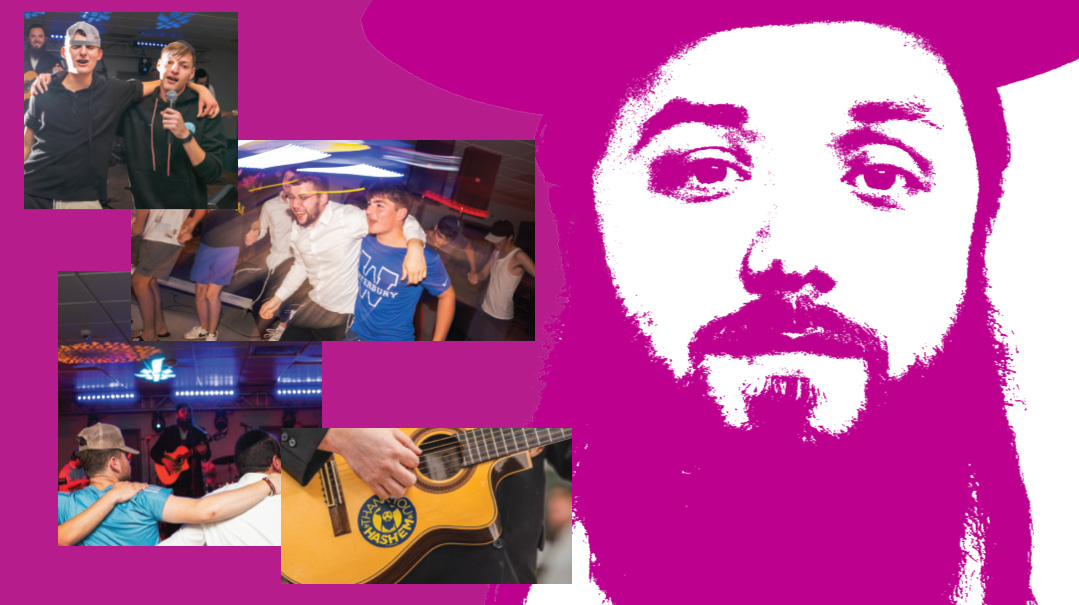
Photos: Dovi Green, Naftoli Goldgrab
The campus of Yeshivas Ateres Shmuel is an idyllic place. Acres of rolling lawns stretch in all directions, tilting upward every now and then to accommodate a gentle hill, and then dipping softly back down. On this clear September night, the vast star-studded black sky lends this resort-enclave-turned-yeshivah an air of absolute tranquility.
Except… from the window of a cabin tucked in the campus’s corner, blue lights flash on and then off, punctuated by red and yellow zigzagging bolts. Booming noise. Music, singing, thumping footfalls.
Inside the cabin, a man is standing on a stage with a guitar tucked around his shoulder so neatly, you’d think he was born with it. His eyes are closed and songs seem to roll out of him effortlessly. He’s concentrating on something but it doesn’t seem to be the vocals. His mind is clearly elsewhere. But where?
Then there’s the crowd. They’re going crazy, but not over him. In fact, few seem to be paying any attention to him at all. They’re dancing — in a circle — but each kid is kind of doing his own miniature dance as well. Hands go up at random, not necessarily in sync with the music. At times those solo dances become too big to handle, so the dancer breaks off entirely, enters the middle of the circle, and jumps and claps and waves his arms. He’s dancing his way, the way that makes him feel right, even if it isn’t typical. Then the other guys catch on and join him in the middle of the circle.
They’re dancing his way; they realize that it makes them feel right too.
That’s the music of Joey Newcomb.
That’s the story of Joey Newcomb.
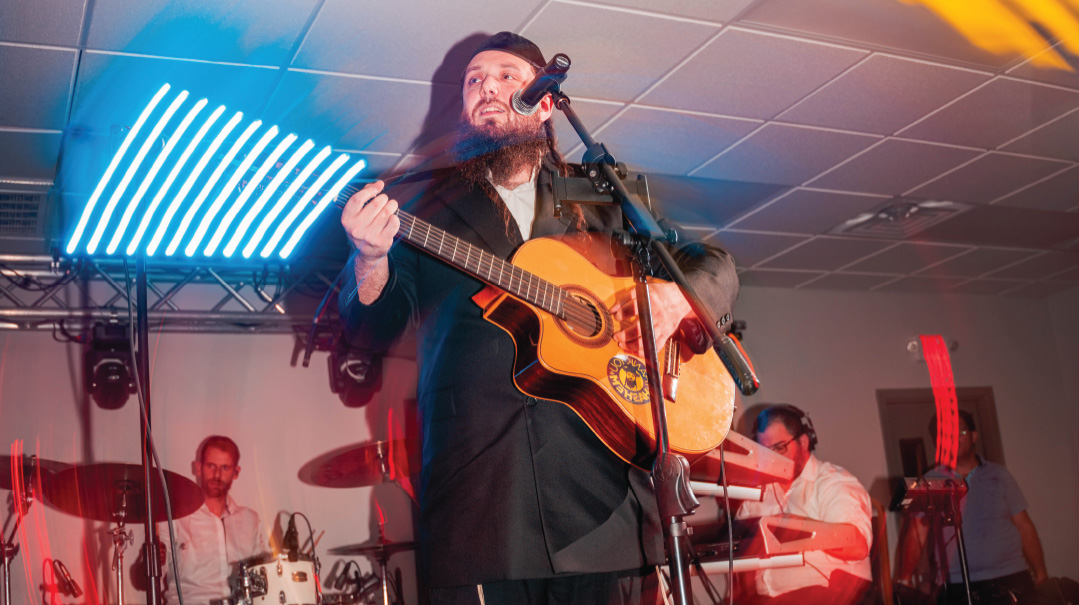
It’s hard to drown out the allure of the hollow world around us, but Joey’s music taps the inner belief that we can rise even after a fall
Joey likes the word avodah — he pronounces it “avoida” — or maybe it’s the concept that he likes. He even named his most recent album Big Avoidas. The plan was for me to meet up with Joey in Far Rockaway and then we’d drive together to Durham where Joey would be performing for the Waterbury yeshivah. The geography is a little confusing. Although the yeshivah’s official name is Ateres Shmuel, it is widely known simply as “Waterbury.” This applies even to the yeshivah’s high school, which is located in Durham, some 40 minutes away from Waterbury. That’s just the way it is.
I arranged to meet Joey in the parking lot of the famed White Shul. It turns out to be a big avodah. It’s Minchah-time when I arrive; the people kept coming, and that means a lot of awkward neck-craning on my part. I’m not looking for a specific license plate or even a car model — no need for that. I just need to see Joey Newcomb’s peyos.
Sure enough, with a wide swing that actually looks pretty musical, a car pulls up and I see what I’m looking for — a black Honda Passport, to be sure, but also the peyos. An easily recognizable Joey Newcomb begins scanning the crowd, but since I have neither his fame nor his peyos, he has no reason to recognize me.
His eyes scan the various people entering and leaving the shul, which means that a series of “How Aw Ya” shouts are in order. People amble over and Joey jumps out of his car to greet them. It sounds celebrity-ish but in real life, it’s actually pretty prosaic. I listen in on the conversations a bit (hey, that’s my avodah); they are the most normal, friendly snippets of small talk that you would have with a close friend in a shul’s parking lot.
And that’s what Joey is: a close friend. People sincerely love him, and he sincerely loves them.
His eyes eventually land on me, the one guy with a dopey star-struck expression on his face. That warrants another round of “How Aw Ya brudda?” and “Ready for some major avoidas?”
I nod. Yes, I’m ready. Who wouldn’t be? What could be more fun than a two-hour car ride with Joey Newcomb?
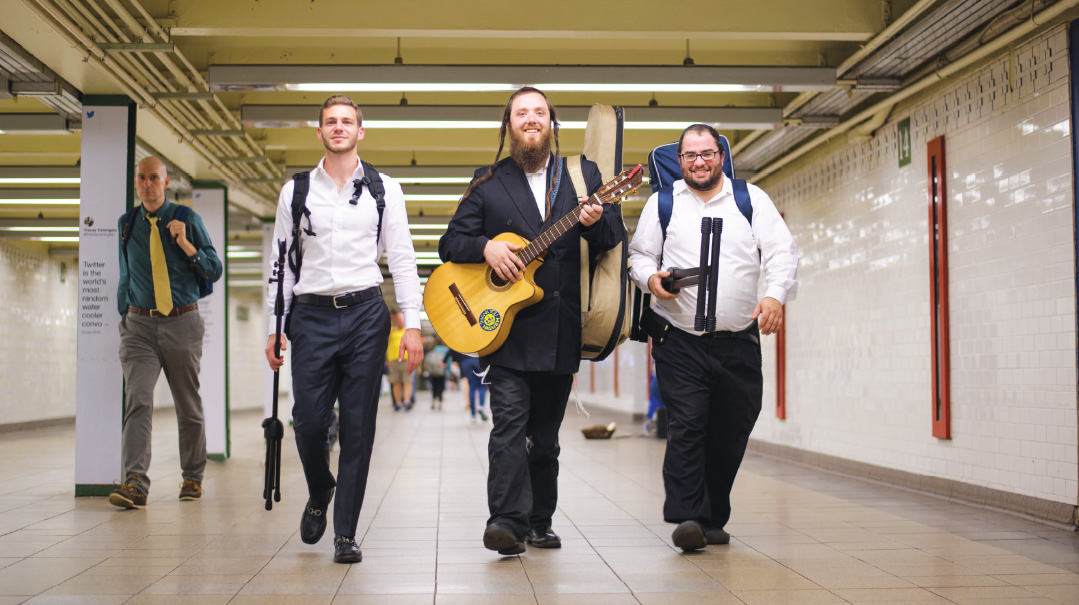
“I look at all my varied jobs as one shlichus.” Joey Newcomb’s message takes many forms, but it’s all bound to one deep truth
IS it crazy to be disappointed that the inside of Joey Newcomb’s car is, well, ordinary? It’s basically clean with just the right amount of pretzel crumbs on the floor, the only unordinary feature being the large guitar case in the trunk.
I need to charge my phone, but so does Joey. No big deal, he has one of those multi-charging cables where each charger type is color coded. It’s tempting to launch into a poetic soliloquy about how that is so representative of Joey himself — colorful, multifaceted, anything to recharge another Yid. But that’s going a bit far, isn’t it?
I buckle up, ready and excited for the ride. But I quickly learn that despite Joey’s easy smile and gregarious manner, he’s not all fun and games.
“So here’s the yesod,” he tells me as we pull out of the parking lot. “The yesod is that not everything has to be perfect.” He stops at a traffic light and explains. “It’s not easy for me to do this gig. It’s five o’clock now. Most people are coming home, ready to do homework with their kids, and I’m getting ready to leave. As I was rushing out the door, I tried to help my kids with their homework, but it really didn’t get far. So as I was driving here I thought to myself, ‘That wasn’t perfect.’ But then I said, ‘So what?! It doesn’t have to be perfect. So long as you’re working on it.’ ”
For Joey, it’s all about the avodah.
We pull off the Nassau Expressway, following signs for the Van Wyck, and Joey explains to me that this concept of failure being a necessary step in the process of life is actually rooted in the creation of the world. There were many worlds that preceded ours, but they were destroyed — the universe we have today is the perfection that results from failure. It’s a kabbalistic idea and that piques my curiosity. Joey’s music makes it clear that he dabbles in chassidus, bordering on the esoterica, and I want to know specifics.
“So, is there any particular line of chassidus you identify with?” I ask.
Joey shakes his head. “I take from everyone. In fact, Rav Kook writes that in the final generations, the works of the talmidim of the Baal Shem Tov and the talmidim of the Gra will be studied together. So, no, I don’t have any one preference.”
Joey has a song called “Bnei Hamelech.” Its lyrics are simple:
“Ani litvak
Ani chassid
Ani breslov
Ani sephardi
Aval kulanu bnei hemelech
Kulam achim, achim ahuvim.”
“I’m a Litvak, I’m a Chassid, I’m a Breslover, I’m a Sephardi, but we’re all children of the King, we’re all loving brothers.”
Although the song is intended to refer to a diverse group of people, in a sense it refers to Joey himself. He learns the seforim of the chassidic masters and the works of Sephardic kabbalists, and he loves to learn the peirush haGra on Mishlei. Ani litvak/Ani chassid/Ani breslov/Ani sephardi. For Joey, it’s all one avodah.
We’re in the heart of gritty New York, but some inspired soul must have planted trees a few decades back. To his credit, a daring touch of nature laces the densely urban surroundings.
The conversation grows deeper yet. Joey quotes a line from the Zohar in parshas Naso, where it was revealed to Rav Shimon Bar Yochai: “B’hai chabura dilach, d’ihu sefer haZohar, yapkun bei min galusa b’rachamim — with this compilation of yours, the sefer haZohar, we will be redeemed from galus with mercy.” “Somehow,” Joey expounds, “in the end of days, prior to the coming of Mashiach, the hidden secrets of the Torah will become more accessible, and common-folk will thirst for the mystical teachings that were once limited to only the greatest tzaddikim.”
But why? Why are we being granted insight into secrets that were kept hidden for so many generations?
Joey answers with a mashal from the Baal Hatanya. There was once a king whose child became extremely ill. No doctor could provide any hope except for one specialist who informed the king that there was one, and only one, possible cure. The king would have to enter the palace’s innermost chamber, and remove the kingdom’s most valuable jewel, passed down from monarch to monarch; aside from royalty, no man was ever granted license to see it. The king must take that jewel, grind it up, mix it with water and feed it to his child. This was his child’s only chance to survive. The king followed the doctor’s orders and, sure enough, the young prince merited a quick recovery.
Sometimes, the greatest secrets are the only chance.
“That’s the pshat,” said Joey. “That’s why chassidus is so popular today. The hidden jewel was taken out of its hiding place so that our frail, weakened generation could recover and experience the Geulah.”
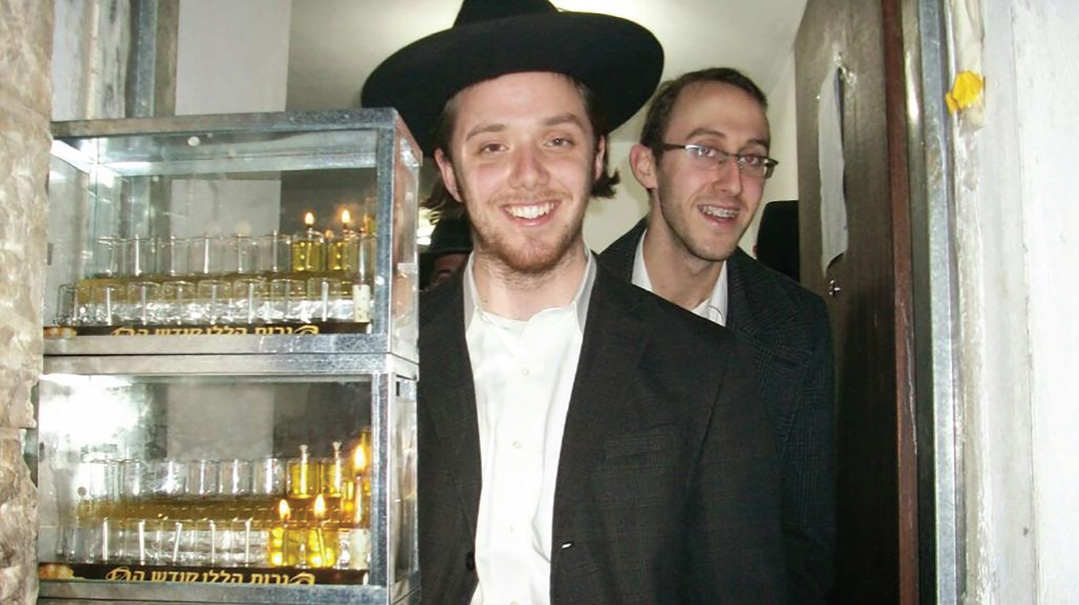
Joey’s connection with chassidish Torah and emotion has deep roots. It was nurtured as early as elementary school, and came blazing to the fore during his years learning in Eretz Yisrael.
I’ve never been to Durham, Connecticut and though I’ve heard much about the Waterbury yeshivah, this is my first time seeing it in action. Along with the requisite black and white, there are lots of colors representative of colorful personalities.
Joey’s scheduled performance — a sort of blend between concert and kumzitz that he calls a “gig” — is set to take place in a room off of one of the batei medrash. He pulls up right outside the building and sees through the window that they’re still setting up.
That means there’s some spare time — but there isn’t really. His easily identifiable silhouette is soon recognized and a couple of guys head over. Joey rolls the window down and “How Aw Ya”s are shared all around. There’s some schmoozing and then Joey pops the trunk, removes his jacket and guitar, and heads in to the room, taking his position at the mic.
To my surprise, there’s no booming emcee welcoming the one and only … JOEY NEWCOMB!!! In fact, there’s hardly anyone around when he begins to sing. He just stands there, guitar in hand, peyos trailing past his shoulders, transcendent expression on his face, strumming and singing.
Curiously, the songs he sings are not his own. Joey’s singing old songs, the type that you heard a million times set to the words of Keil Adon or Lo Seivoshi; I wondered if that’s the wisest choice for this decidedly more up-to-date audience.
Slowly the boys start trickling in and Joey sings on, stationed before his microphone, his voice steady and constant. And then, all of a sudden, the entire room springs to life. The boys join hands, dancing and jumping and clapping, white shirts and yellow tank tops leaping into the air with equal buoyancy, voices screaming out the niggunim with shared exuberance.
Then there’s a collective shriek and the crowd goes wild. It takes me a moment to figure out what song Joey’s playing. It’s not his boisterous march, “Mi K’amcha,” or even the rollicking “Thank You Hashem.” It’s the old standard, “Ashreinu mah tov chelkeinu u’mah na’im goraleinu.”
Ashreinu is a beautiful song but I’ve heard it a thousand times and, at this point, when they play it during my shul’s Chanukah party, I’m usually noticing that the number of franks-in-blanks on my plate are disproportionate to the number of little eggrolls, so I head over to the buffet table to even things out.
But here, the song is a smashing hit, fists punching the air as the unified voices roar “Ashreinu — how fortunate we are! Mah tov chelkeinu —how good is our lot!”
It’s not the melody that’s exciting them, it’s the message. These boys have been around the block, some a couple of times, contending with a wildly decadent world that insists it’s the place to be. The flashing lights of a million screens and the jeering smiles of icons who claim to be the champions of happiness make a compelling case; it’s hard to drown out a billion voices. But here these boys are celebrating what they knew to be true all along. Ashreinu mah tov chelkeinu — it’s we who are truly fortunate. Let the rest of the world smile outwardly and wilt inwardly; here, we’re gonna dance for real.
Later on, in the car ride back to New York, I asked Joey if his music would have been a hit had it come out 15 years ago.
“Probably not,” he responded, “but that’s all part of it. It’s all part of the secret jewel that only becomes revealed at the end of time.”
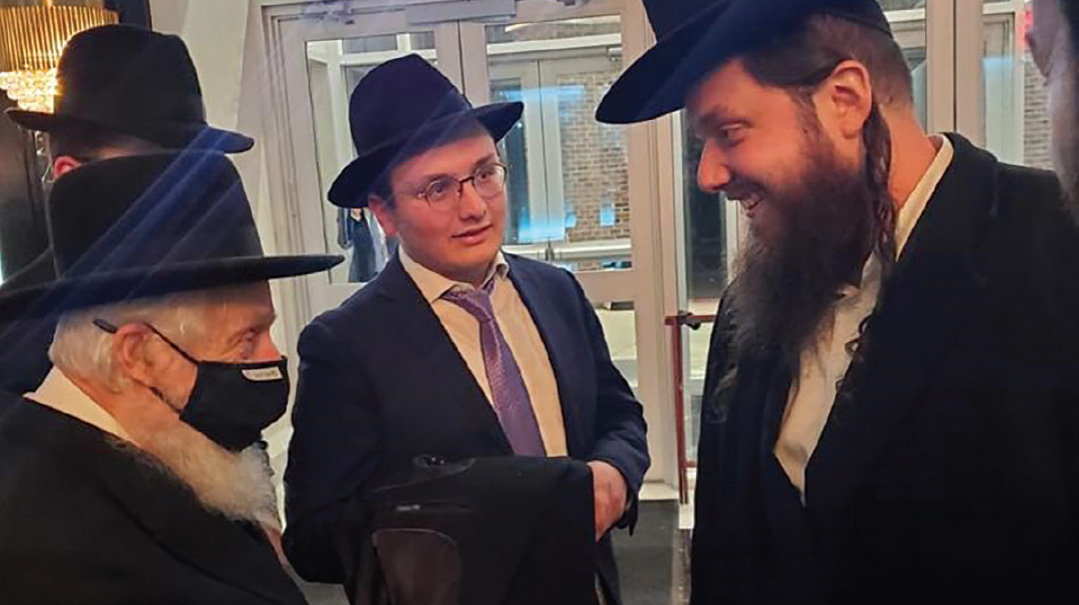
With Rav Dov Tzvi Kreiswirth ztz”l
Joey was exposed to the secret jewel of chassidus from a very young age. The oldest of three children, he was born and raised in Kew Gardens Hills, New York, where he attended Talmud Torah Siach Yitzchok for elementary school through eighth grade. Founded by Rav Shlomo Freifeld ztz”l, the school still exudes Rav Shlomo’s legendary warmth, his vibrant love for Yiddishkeit, and deep connection to Toras Hachassidus.
“The rebbeim there were all chassidish,” Joey tells me, “and they lived with chassidish ideals. Every Rosh Chodesh came with a festive seudah, Chanukah had the most beautiful divrei Torah, Lag B’Omer was the highlight of the year — we didn’t have an annual baseball game, we celebrated Rabi Shimon, we connected to the day.”
Siach Yitzchok planted the seeds of a love for chassidus in Joey, and those seeds bore fruit — quite literally.
“My son now goes to Siach Yitzchok,” Joey says proudly. “When I originally took him to the menahel to be interviewed, I said, ‘I don’t want to send him here because of your internet policy or educational philosophy. I want my son to attend Siach Yitzchok because until today, I can’t go through a Rosh Chodesh without washing for a seudah and having a farbrengen. I want my son to have that in his bones too.’”
It wasn’t just his schooling. Joey’s family also has roots in chassidus and Joey’s father has a strong chassidish bent. In fact, he was Joey’s inspiration for the now-famous beard and long peyos.
But his parents inspired something else inside him as well. “My family was always into music — my parents are musical and we had music playing in my car all the time. I just never tried to create it myself.”
Joey completed eighth grade, and it was time to head off to yeshivah. The transition from the warm, energetic experience of Siach Yitzchok to the far more rigorous and intense style of mesivta high school was difficult for Joey, and the initial year came with some challenges. It was recommended that Joey apply to Yeshivas Shaarei Arazim in Monsey, led by Rabbi Yisroel Mayer Rosenman and Rabbi Zev Freundlich.
“Shaarei Arazim is a gevaldige place.” Joey smiles widely. “They very much encouraged the boys to engage in extracurricular activities, one of which was music. That was the first time I picked up a guitar.”
He had a hard time putting it down.
“I got crazy into it. I played at every yeshivah get-together, every mesibah, I just played and played and played.”
Joey’s experience at Shaarei Arazim was a positive one; it was there that he found so much of himself and discovered a talent that would open up a whole new universe for him. He graduated 12th grade and chose the Yeshiva Gedola of Bridgeport as the next step in the journey.
And then something unexpected happened. “I had always been into ruchniyus,” Joey qualifies. “I was always talking to Hashem in English, asking, thanking, complaining. But much as I felt connected to ruchniyus, I can’t say I felt that connected to learning.”
Until one day.
“I was in Rabbi Avrohom Neuberger’s first-year beis medrash shiur when all of a sudden, things began to click. I started getting into Gemara. Really into it. It began with first seder, then on to second seder. Suddenly, I loved learning.”
That wasn’t the only thing he discovered during his first year in Bridgeport.
“Someone in yeshivah named Chaim Levy approached me holding a Carlebach album and said, ‘Here, you gotta listen to this.’ Now, of course I’d heard of Carlebach before, but I never really invested any real interest in it. This time, I listened closely. I still remember that first album. It had the song ‘Yisrael B’tach Bashem… for me and for you it’s still Yom Kippur.’ I was completely taken by it. The warmth, the depth, it just overwhelmed me. So, all of a sudden, I was learning like crazy during the week and then, come Thursday night, there was cholent and we’d sit around and I’d be leading this huge Carlebach kumzitz.”
Joey is transported to a different time, a blissful era. “I made a siyum on Maseches Nedarim that first year,” he remembers. “I made a 360 on my entire life.”
It’s now years later, and Rabbi Neuberger still remembers his transformation. “I’m still close with Joey,” he tells me, “and I always tell him, ‘You pivoted too fast — I can’t even take the credit for it!’ My shiur has a very interactive style, and we would just go at it, firing away at each other in learning.”
As his rebbi, Rabbi Neuberger also got to observe how Joey connected with his friends; there’s a magic there, and Rabbi Neuberger thinks he knows what it is.
“There are two middos Joey has that makes him so relatable, so enjoyable to be with. First, he is extremely authentic. With Joey, what you see is what you get — he’s not hiding anything and people sense that. Second is his ayin tovah. Joey only sees the good in others and that’s why people feel good about themselves when they’re around him.”
Joey’s experience in Bridgeport, which drove home how impactful a rebbi can be, might explain another component to his life. Because, aside from being a singer of international acclaim, Reb Joey Newcomb is also a rebbi in a yeshivah. When he isn’t traveling, mornings will find Joey in Yeshiva Ateres Shimon of Queens — more commonly known as “Rabbi Groner’s yeshivah” — teaching, counseling and, yes, farbrenging with the talmidim.
And it’s not only the talmidim of Ateres Shimon. “I get calls all the time from bochurim,” Joey tells me. “Random calls from kids in Lakewood, Monsey, or elsewhere. I don’t answer my phone to unknown callers — I don’t have time for that — but sometimes, they text me and, if it’s sincere, I have no problem responding and trying to help.”
It’s a rough world out there, and kids who have stumbled over one of life’s million obstacles, looking for a hand to help them back up, will often turn to Joey. His song “You fall down, you get back up, you fall down you get back up, sheva yipol tzaddik” talks directly to that theme. Joey doesn’t want to just sing it, he wants to actually help people back up, and he does that with quite some success.
Some boys have stayed in touch long after their initial phone call. “I don’t have any formal follow up sessions,” Joey explains, “my schedule doesn’t allow for it. But guys are definitely welcome to stay in touch and several do. Sometimes I’ll have one long phone call where I’ll try to help a boy navigate through a particular difficulty, and then the relationship will continue through text or WhatsApp.”
It takes a lot of his precious time, but Joey sees helping these boys as an obligation. “If someone is looking for chizuk and I happen to know a thing or two about the inyan, I feel a sense of responsibility to provide whatever guidance I can.”
For Joey, this isn’t some sort of extracurricular chesed project; as all things Joey go, it’s one big avodah. “I look at my whole life as a shlichus, it’s all one and the same,” he says.
Joey was once explaining his various professions to someone. “Aha, so, you’re a rebbi in the morning and a singer at night,” the fellow said.
“No,” replied Joey. “It’s the same avodah. Just over there I’m standing before a Gemara and over there I’m standing with a guitar — but it’s the same avodah.”
Sometimes the guidance is structured, like the vaad he leads on shemiras einayim. “It’s one of today’s biggest struggles and the bochurim need guidance. We’re currently going through a sefer together called Zos Brisi that focuses on this inyan.”
But a lot of the work he does is unplanned and unofficial. “The guys need to talk to people that they can relate to. It’s obviously most important to develop a relationship with a rebbi, but there’s also something to being able to talk a regular guy with regular nisyonos. I’m just a regular guy trying to pull through life with simchah and emunah. And when people can relate to you, they can take the message quicker.”
The theme of not letting past missteps dictate the present runs through his new song, “Im Yesh Mikveh Yesh Tikvah.” The words are attributed to Rav Nosson Breslover, who would say that the word “Mikveh” shares a root with the word “Tikvah,” which means hope. Even after someone stumbles, the purity of a mikveh lends encouragement, hope, and a path forward.
The recording — a collaboration between Joey and Shmueli Ungar — starts with the two singers alternating the words “Yesh Mikveh Yesh Tikvah” at a slow tempo with rap-like repetition. The chorus of the song picks up speed and quotes the verse in Yirmiyahu, “mikveh Yisrael Hashem.” The song’s message is that Hashem is the great Purifier, and that means there is always a path back, there is always hope.
But there’s a story Joey loves that might make for a great remix one day. The story, as Joey tells it, goes like this: On Friday nights, the chassidim of Reb Shloime Radomsker would join hands and dance together in a large circle. Reb Shloime would stand in the middle of the dance and dip downward, as if he were lowering himself into a mikveh.
He was immersing himself in the achdus of Klal Yisrael.
Because that, too, gives hope.
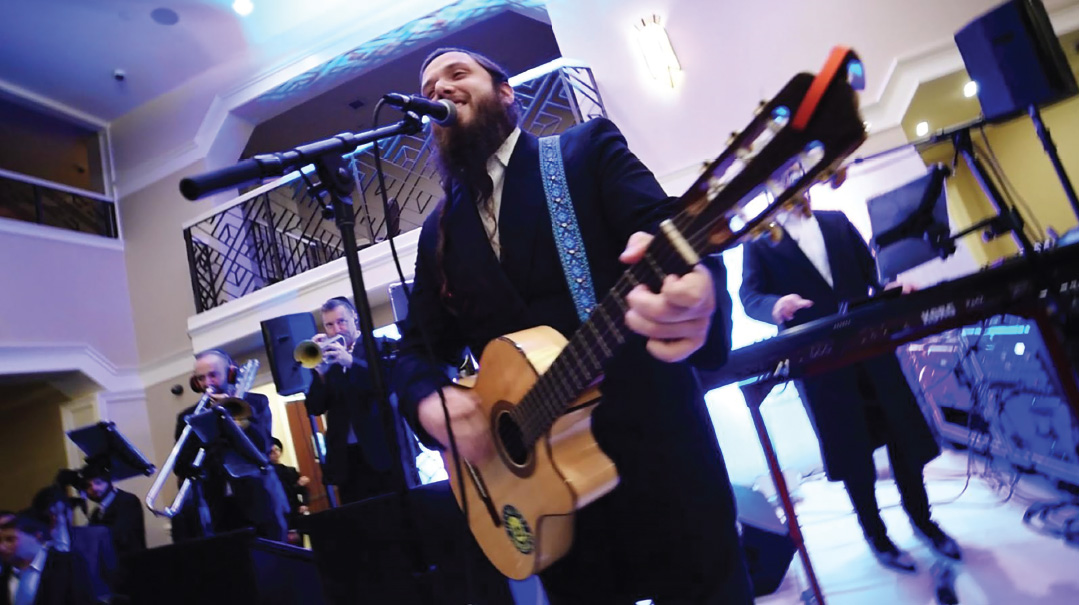
Iassume that one of the differences between a gig and a concert is that a concert begins at a specific time, with the audience seated in their designated places prior to the commencement of the event. Gigs don’t work that way. When Joey begins singing, the room is nearly empty, with a few boys hanging in a far corner.
But Joey doesn’t seem to notice. He picks up his guitar and starts with his trademark “How aw ya over there.” He repeats this line a few times, in a singsong voice that holds a partial tune which somehow leads directly into his first song, an old bum bum bum ballad that has a few people shift positions.
Then the song picks up speed and so do the people.
I don’t think there was any conscious decision to start dancing; it just happens — the spirit of the moment demands it. The dancing gets faster along with the music. There’s a lot of jumping, not necessarily to the music’s beat, but definitely in sync with something. These boys’ souls are telling them to jump, so they do.
The colors. All those colors. They blend so naturally together, the white and the green and the black and the burgundy, all dancing together, celebrating a common cause, moving toward a shared destiny. There’s no telling what prompts certain people to randomly jump into the middle of the circle; I doubt they understood it either. From afar, all I can see are heads — forward baseball caps, backward baseball caps, large black velvet yarmulkes — all rising together.
Later, I will learn that I was only seeing half the story.
Mordy Weinreb, a dorm counselor in the yeshivah, fills me in on the true significance of the moment.
“This is the second week of Elul zeman,” he explains. “There are about a hundred new boys in the yeshivah, and they barely know each other. But somehow, Joey just brought everyone together. It’s such a unique koach.”
It’s not just unique, but unlikely. The crowd here is very current and contemporary while Joey, conforms with little, if any, of the current trends. Nothing about his beard, peyos, or double-breasted jacket could be described as anything close to “cool.” So how is it that he relates to the young and current demographic so well — and why do they relate to him?
“I’m not sure how he does it,” muses Nochum Wolf, Logistics Director at Mesivta of Waterbury. “Somehow, when Joey starts singing everyone gets involved, not just in the music, but in a real quest to connect to something spiritual.”
Mordy has a different take: The question, he says, is a mistake. “Cool or not cool, Joey is a very real person. Being real resonates with everyone. And the fact that he’s so real and doesn’t care what people think about him is cool in itself.”
Now Joey launches into the Diaspora Yeshiva Band’s iconic “Ivdu es Hashem b’simchah,” and I have never seen such simchah. The circle of dancers completely disintegrates, making way for a collective, triumphant kind of random leaping, the kids’ arms flailing wildly in the air.
I watch and I remember Joey’s Bnei Hamelech song.
“I’m a litvak, I’m a chassid, aval kulanu bnei Hamelech, kulam Achim Ahuvim.”
That song wasn’t playing but it was ringing in my ears anyway, with slight variations in the lyrics.
I’m a ninth grader, coming off a terrible eighth grade experience
I’m a dorm counselor who’s seen it all and lived to tell the tale
I’m a 12th grader, confused about my next step in life
Aval kulanu bnei Hamelech
Kulam Achim Ahuvim
Whoever they are, wherever they come from, tonight, they’re all bnei Hamelech, basking in the light of that hidden jewel.
At some point, the music slows and the dancing dies down. Chairs are lined up in rows and the crowd sits down, swaying from side to side, arm over shoulder. It isn’t staged or preplanned; it’s the spontaneity that characterizes the evening, a feeling so strong and so shared that you just know what to do and you know that your neighbor knows it, too.
At some point Joey starts singing his song, the mantra of a People clinging to truth while navigating the murkiest time in history.
“You fall down you get back up
You fall down you get back up
Sheva yipol tzaddik”
I notice some boys standing during this song, shuckeling vigorously to the music. It seems as if they’re acting out the song — falling down, and getting back up.
Unity creates a purity so real that Reb Shloime Radomsker would immerse in it.
When Joey sings there is unity, when Joey sings there is purity.
And when Joey sings, there is hope.
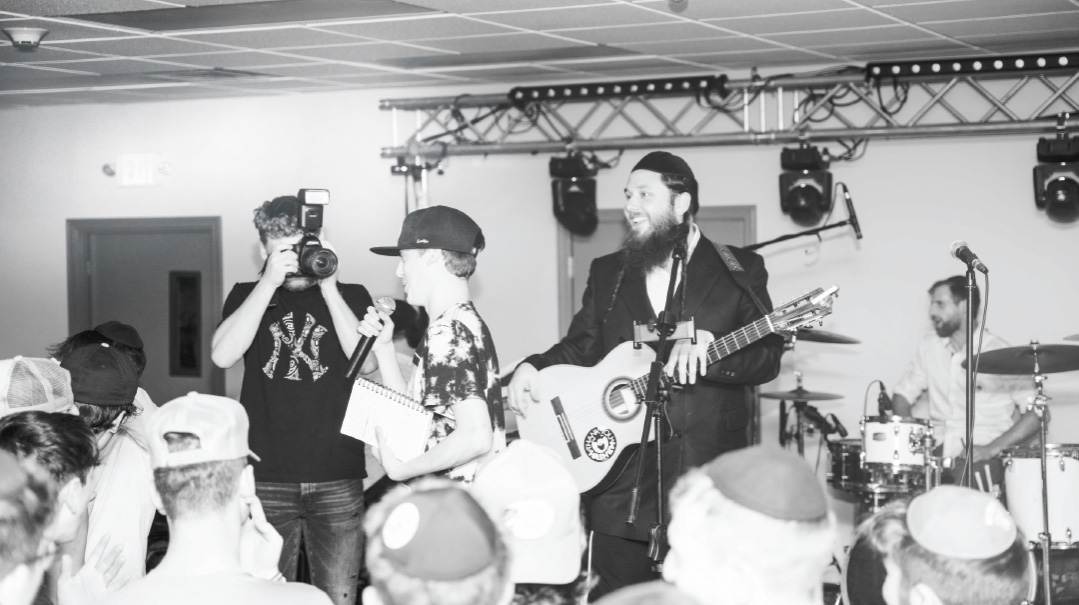
The crowd is very contemporary while Joey is anything but. Still, authenticity speaks to everyone
Joey didn’t just learn well in Bridgeport; he became the whole vibe of the yeshivah. He was front and center, both within the beis medrash and without. But learning well wasn’t enough for Joey; he wanted to grow, and at some point he’d grown as much as he could in Bridgeport.
“I got a call from my friend Shimmy Grama a”h, who was learning in Eretz Yisrael. He said, ‘Joey, you gotta come to Mercaz.’ ”
Joey scheduled a telephone farher with the menahel of Mercaz HaTorah of Yerushalayim and was readily accepted. At 19 years old, he was off to Eretz Yisrael.
“I was already fired up,” says Joey. “Eretz Yisrael just boosted it. In Mercaz, I was flying.”
Chassidus had been part of Joey’s life since his early childhood, but during his years in high school and beis medrash it lay somewhat dormant. “But when I got to Eretz Yisrael, I started to pursue chassidus. I would go to Rav Tzvi Meyer Zilverberg for Seudah Shlishis — I was captured by the fire, the dveikus. With Rav Tzvi Meyer, you listen to one derashah, sing three niggunim, and before you know it, you’re doing teshuvah me’ahavah.”
But it wasn’t only in Rav Tzvi Meyer’s beis medrash that he found that electrifying feeling. “My first Shabbos in Eretz Yisrael I went to Be’er Sheva,” Joey continues. “I was freaking out! This place is mentioned in the Torah!”
Everywhere he turned, Yiddishkeit was alive. “I went to the Kosel for the first time. I ripped my shirt with the holiest kavanah.” An explosion of spiritual aspiration had gone off inside Joey; his growth in ruchniyus began galloping at breakneck speed.
“I was learning shtark, very shtark. I learned chassidus but also mussar, I finished Mesillas Yesharim that year. But I knew myself and I knew what I needed; I would frequently go to Tzfas for Shabbos — as much I was a masmid, this was part of my identity and my rebbeim understood.”
Joey remained in Mercaz for three years, until he felt it was time to move to the next level. Actually, it was his rebbi who encouraged it.
“It’s better to be at the bottom of the Mir than to be at the top of Mercaz,” his rebbi said. And with that, Joey headed off to the Mir, to join the shiur of Rabbi Elimelech Reznick.
“Rabbi Reznick was a gevalt,” is Joey’s description of his then newly-minted rebbi, “but that first Elul zeman was tough. The Mir was packed, I couldn’t even get a seat in the beis medrash — there was a lot of adjusting to do.”
But then, in what seemed to be part of his personal growth pattern, Joey returned for winter zeman and went for another pivot. “The rest of the year I was flying, the learning was going well, and the chassidus was still burning inside me.”
After a year learning in Rabbi Reznick’s shiur, Joey once again felt it was time to move on, but in a slightly different sense. He was 22 years old at this point and wanted to enter the parshah of shidduchim. He returned to America and joined Rav Asher Weiss’s yeshivah in Monsey.
Friends were concerned that the very out-of-the-box Joey Newcomb would have a hard time finding someone who could understand him, let alone put up with him. Joey proved them wrong.
“It took some time but not that much of it. I met my wife within the year.”
Joey’s shidduch came about in a way that, well, only Joey’s shidduch could come about. He laughs even before beginning the story.
“I was dating for some time and when summer came along I was a counselor in Camp Chazak, a day camp in Queens. There was this one camper there, a cute little kid who kept telling me that his mother is a shadchan. One night, there was a late-night activity that involved campers throwing counselors into the pool. I was one of those counselors — I was soaking wet, wearing a squished cowboy hat on my head — when the boy informed me that his mother, the shadchan, was there. I was overtired, feeling nuts, but off I went, dripping from head to toe, to meet the shadchan. She looked at me and said, ‘I have the perfect girl for you.’ ”
The shadchan redt a soaking wet Joey Newcomb to Chaya Gittel Ackerman.
Today, Joey and Chaya Gittel Newcomb have, bli ayin hara, three children.
But the Joey Newcomb-type craziness didn’t end with the shidduch’s suggestion. The story continues.
“Now, just to show you how I knew I met my match. It happens to be that, back when I was a young teenager, I taught myself Chinese. Anyway, I had this shtick that, before going on a date, I would preset the dial on the dashboard to Chinese radio. So, once we were settled in the car, the radio would turn on and you’d hear ‘’ I would listen with a very serious expression and say, ‘Oh, better take the Belt Parkway.’
“When I tried that with my wife, here’s what happened. She reached out and sneakily adjusted the GPS to Chinese. I was driving along when suddenly I heard, ‘’ I ended up taking the wrong turn — which was annoying — but I had to admit, she got me.”
The newly married couple settled in Queens. Joey learned in Shor Yoshuv in the morning and Rabbi Binyomin Forst’s kollel, which operated out of Agudah of Kew Gardens Hills, in the afternoon. He later moved to Rabbi Oppenheimer’s kollel. At some point, Joey began traveling to Great Neck at nights to learn with balabatim and, once a week, with Jewish public school students. “I always got chiyus from being a mashpia. I loved kiruv, I loved connecting, I loved schmoozing.”
Joey loved kiruv so much that he began applying for different kiruv positions. “But that first job never happened — because I got my first gig.”
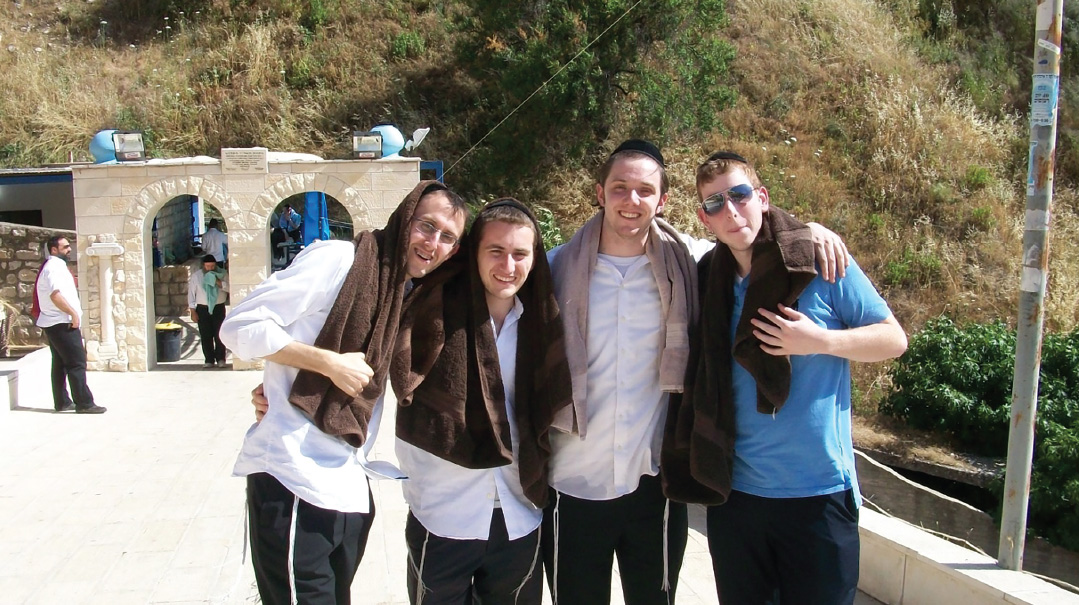
“I knew myself, I knew that I needed Shabbos in Tzefas even while shteiging in Yerushalayim. It was part of my identity.” Joey as a bochur
IT came as a simple ask: Would Joey be so kind as to come play guitar at a sheva brachos. The fellow making the request was a friend of Joey’s named Yitzi Gross. Joey readily agreed.
It was a great gig as far as gigs go. So great, in fact, that the next night, one of the attendees called Joey to hire him for their sheva brachos.
And then word began to spread: There’s a guy by the name of Joey Newcomb who is great on the guitar, he’s funny, engaging, shares great Torah. The gigs started coming with increasing frequency.
There’s something about Joey that makes him very gig-friendly. His routine is low on formality and high on personal interaction. “I’m very interactive with the oilem,” Joey tells me. “I make eye contact, put my arm around shoulders, and am happy to have others suggest niggunim.”
Having others suggest niggunim is actually helpful, he says. “Choosing the right song for the right crowd is tough. Sometimes, certain settings make it easier. If it’s a Chabad oilem, I’ll make the music Chabad centered; if it’s a Sephardi crowd, I’ll put in a lot of Sephardi music. But on the other hand, that sometimes backfires. Because if a Sephardi kehillah hires me, it’s not to hear Sephardi music — they have other resources for that. So sometimes I have to test the waters. I start a niggun and see how it goes.”
And, Joey admits, it doesn’t always go well. “When I go to a camp or a kumzitz, people are already in farbrengen mode. But in other settings, it can take a long time to get the oilem going. And I really need to reach that point. If the crowd just sits back and listens, I’m unsatisfied. I need to have interaction; I need to have the oilem involved.”
As he became more adept at the art of the informal gig — reading a room, feeling out an audience, bringing them into the action — Joey also composed a few songs. His popularity grew and he began contemplating the possibility of putting out an album of his own. But to do that he would need a producer. Who to call?
Joey reached out to a few of the better-known names in the industry but nothing was panning out. Then he was struck with a very obvious idea. Yitzi Gross, the friend who got Joey his first sheva brachos gig, has a brother by the name of Doni Gross. Since that debut gig, the Gross family had hired Joey on a few occasions and Joey had gotten to know Doni.
Today, Doni is one of the most sought-after producers of Jewish music, but at that time, his star was just beginning to rise after producing the Kumzitz in the Rain albums. Joey called Doni and asked him what he thought about putting out an album.
“Don’t do it,” was his response. “Not worth it.”
Joey was disappointed. “It’s at least worth a try,” he insisted.
“All right,” said Doni, “maybe we can try to put out a single. That’s cheaper, less risky. Why don’t you send me what you have?”
Joey sent him three songs: Bnei Hamelech, It’s Never Too Late, and Mei’ayan.
“Five seconds later I look at my phone and see three missed calls.” They were all from Doni. Joey called him back and the young producer was singing a very different tune now.
“The whole vibe of your music is different; this is something that no one else is putting out there.”
In July of 2018, Bnei Hamelech was released as a music video and it went viral. That summer Joey put out another three music videos.
Joey’s open about the fact that his songs aren’t products of hard work or meticulous planning. “There are chevreh who have a talent where they can sit down, open a Tehillim, try a couple of tunes, and then hit gold. For me, it’s never like that. Writing is completely l’ma’aleh min hazeman. The song comes to me in 20 seconds and it’s always on the heels of some sort of inspirational experience. Every song comes with a story. Bnei Hamelech came to me because I was in some shul where four people were davening in front of me. One was a Litvak, one a chassid, one a Breslover and one a Sephardi. Literally.”
Over the next several months Joey worked together with Doni to produce his first full album. To Be A Yid hit the stores on January 28, 2019. It was a great album with great songs and by the time listeners reached the last song, they were pretty sure that this singer would be the next big thing. Then they listened to the last song, heard the burst of positivity and gratitude oozing forth, capturing hearts and lifting people off their feet as Joey sang, “Nai na na na na na, Thank You Hashem!… Thank You Hashem!”
The listener now knew, beyond any doubt, that this singer was already the next thing.
Today, Joey Newcomb is a household name, synonymous with a certain type of message as much as a unique brand of music. But there’s no question that it’s the message that is propelling his songs to such wild popularity.
“People are searching for connection,” Joey explains. “Take, for example, the trend of musical Havdalahs. Today it might have become the thing to do, but how did it start? Because people have been hearing a mumbled ‘hinei-Kel-yeshuasi-evtach-v’lo-efchad’ their whole lives. But there’s a desperate search for meaning today, and a musical Havdalah opens the gates to the rich depth of bidding farewell to Shabbos and fortifying ourselves as we enter a new series of yemei hachol.”
In these final days, as our darkened world merits strains of light from a long-hidden jewel, something inside the Jewish soul stirs. It calls for help — and Joey Newcomb is doing his best to answer. His message is one of meaning, and his searching People are listening intently.
“Joey,” I ask suddenly, “does it ever get to you?”
“Does what ever get to me?” Joey seems puzzled and I regret asking the question.
“The fame,” I explain, somewhat sheepishly. “Like, doesn’t it make it hard to be an anav?”
Joey is quiet, so I press on. “On the one hand, we’re taught that we’re supposed to think nothing of ourselves and here you have all these people—”
Yikes. Joey almost veers off the highway.
“Supposed to think nothing of ourselves?” he asks, scandalized. “No, we aren’t! Of course we aren’t! I’m a somebody and there’s nothing wrong with knowing that. In fact, that’s the only way to protect yourself from gaavah. Always know that you’re a somebody. That way, when someone compliments you, it doesn’t get to your head. You knew it all along.”
You’re supposed to know that you’re a somebody, says Joey. I should have guessed.
Kulanu Bnei Hamelech was his first song.
There seems to be some Waterbury custom in which the menahel, Rabbi Daniel Kalish, selects boys from the crowd and sends them up to sing. Joey hands them the mic and stands back, moving forward only to adjust the stand.
You’d expect them to sing shyly, reluctantly, giving lip-service to their menahel’s directive. But they don’t. They grab the mic and belt it out, eyes shut tight as they sing from the depths of the neshamah.
A Waterbury favorite seems to be 8th Day’s “Avraham.” The gig has now entered full kumzitz mode and, arms linked, eyes clenched shut, the crowd sings the piercing message to the first of the Avos. Rabbi Kalish motions to a boy to approach the stage. He grabs the mic and his voice rings.
“Avraham, are we the children that you dreamed of?
Are we that shining star you saw at night?
You know it’s true, we still call you Avinu
Our father, our pride, we’ve got your soul inside, take us home—
Take us home.”
The crowd goes wild, cheering their friend-turned-singer, hugging and sharing back slaps.
All the while Joey just stands, watches, and smiles.
Later Mordy Weinreb tells me that, after the gig was over, he overheard Joey voicing a complaint: “A few years ago, I did a gig here and the guys had the mic for a full hour — why so short this time?”
The singer is upset that he got too much stage time. That’s an avodah.
A similar observation is made by Chemy Soibelman, a well-known name in the industry who was Joey’s drummer that night.
“I’ve observed many artists in action,” Chemy tells me. “It’s such a beautiful thing to watch a singer come onto the stage and go out of his way to make a person feel good. I’ve seen that many times and it’s truly inspiring. But with Joey, he doesn’t make one person feel good, he makes everyone feel good.”
Yaakov Zeines often plays the keyboard at Joey’s gigs. He was in Durham that night and reflects on the experience. “Joey understands how to uplift everyone,” he says. “He makes them feel like a million dollars.”
Or, more precisely, he makes them feel like Bnei Hamelech.
The trip to Durham isn’t all intensity and profound insight. It has its fun moments as well. Joey tells me about his voice lessons and demonstrates these weird sounds that are apparently good for his vocal cords, but they crack me up, nonetheless.
I’m not much of a singer but we do find a joint passion: Abie Rotenberg’s Journeys albums. Both Joey and I consider ourselves Journeys aficionados and I give him a thorough exam, which he passes with flying colors. The questions are tough. Which food did Kloinymous Kalman begin eating due to the influence of his neighbor? Where should one send their spare cash? We even run through some Marvelous Midos Machine trivia — which toy cost $19.99?
But there’s one song we don’t cover that would have been most appropriate. Track One of Journeys IV features a song called “The Band.” It’s about a motley crew that didn’t know much about music but had pure intentions — “All they wanted to do was bring simchah to Yidden with music.” And then Mashiach comes, and the long-rejected band is selected to play the music honoring the greatest day in history.
Joey, you’re a whole lot more talented than the guys in that song, but the song still rings true. Mashiach’s gonna come soon, you know that. It’s one of the first things you mentioned as we headed out to Durham — “B’hai chabura… yapkun min galusa — when we absorb the hidden light of chassidus and penimiyus haTorah, Mashiach will come.” And when he does come, I’m sure many will have the privilege to sing and play music in his honor.
But for some reason, I envision the grand finale being one final round of “Thank You Hashem,” swelling from the voices of an entire nation, finally united. In the middle of the circle will be Mashiach himself, immersed in the purity of our unity. On his head will be a crown, upon which rests a jewel, beautiful, magnificent, familiar.
Again and again we’ll sing “Thank You Hashem,” for the good, for the perceivably bad. Thank You, Thank You, Thank You Hashem.
And then the music will die down and we’ll say thank you to Joey too.
For an avodah very well done.
(Originally featured in Mishpacha, Issue 931)
Oops! We could not locate your form.







